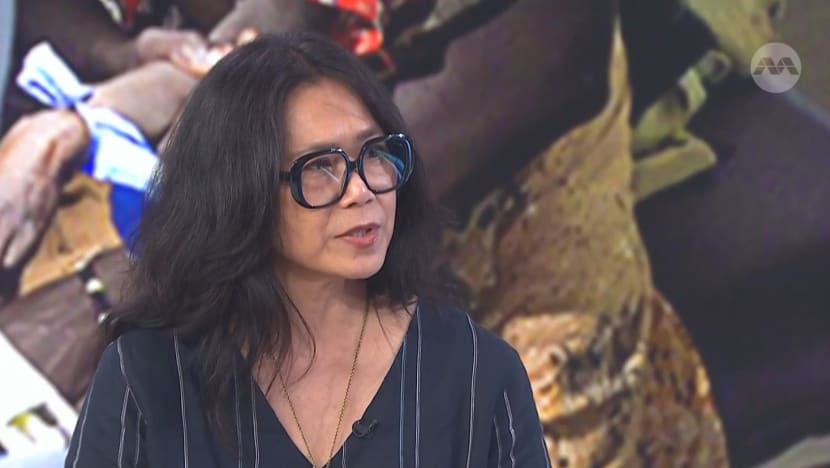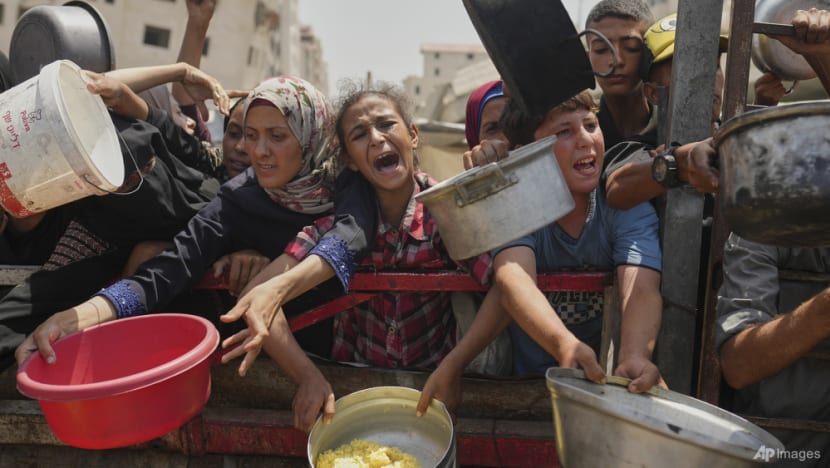Gaza blockages, US foreign aid cuts deepening humanitarian crises: Doctors Without Borders
More than 100 groups said in a joint letter last week that Israel has increasingly used new stricter legislation, which regulates foreign aid groups, to deny their requests to bring supplies into Gaza.

Dr Maria Guevara, international medical secretary of Medecins Sans Frontieres (Doctors Without Borders), speaking to CNA on Aug 18, 2025.

This audio is generated by an AI tool.
Amid growing concerns over widespread starvation in Gaza, Medecins Sans Frontieres (MSF) – or Doctors Without Borders – is among dozens of aid groups sounding the alarm over what they call Israel’s “weaponisation of aid” in the Palestinian territory.
“It’s only getting worse since the beginning (of the Gaza war),” said the humanitarian charity’s international medical secretary Maria Guevara on Monday (Aug 18).
Between May and July, the number of victims in MSF’s hospitals and facilities in the Gaza Strip surged from about 2,000 to 3,700, she added.
“What we’ve seen in just the (past) seven weeks … it’s at least 71 children already as victims. Forty-one of them were around the Gaza distribution sites. And when you see an eight-year-old kid shot in the chest, this is not by hazard,” she told CNA’s Asia Now programme.
In a joint letter released last Thursday, MSF was among more than 100 groups that said Israel has increasingly used new stricter legislation – which regulates foreign aid groups – to deny their requests to bring supplies into Gaza.
According to the letter, at least 60 requests to bring aid into Gaza were rejected in July alone.
Israel has denied there are restrictions on aid and said the rules, introduced in March, ensures aid “reaches the population directly and not Hamas”.
UK-based Oxfam said US$2.5 million worth of its supplies, including food, were barred from entering Gaza. Another charity, CARE, said it had not been authorised to bring in aid since March.

“These are the things we’re seeing on top of increasing malnutrition cases … and when adults are starting to die, you know you’re hitting famine levels. And yet, the aid’s not coming in,” said Dr Guevara.
“When you have 500 trucks that used to come daily into the Gaza region, which is (down to) a trickle today, you're bound to have increasing mortality, plus the increasing violence and attacks on those who are working and trying to save their own people – humanitarian workers like us.”
Israel has repeatedly rejected claims of deliberate starvation in Gaza, while the United Nations (UN) and aid workers have warned of widespread famine in the war-torn territory.
IMPACT OF US FOREIGN AID CUTS
Residents in Gaza and other conflict zones have also been badly affected by the United States’ deep cuts to its foreign aid programmes, noted Dr Guevara.
US President Donald Trump gradually shuttered the US Agency for International Development (USAID) – the country’s main foreign aid agency – when he returned to the White House in January. The agency officially closed last month.
US funding was not just helping humanitarian efforts but also global health, making up at least 70 per cent of support in many countries, said Dr Guevara.
“I think there is this huge domino effect of now not (being) able to get that aid,” she added.
In a study reviewed by global think-tank Center for Global Development, 26 low-middle income countries will be most affected by these aid cuts. These include Afghanistan, South Sudan and the Democratic Republic of Congo (DRC), Dr Guevara noted.
“Those (nations) are so significantly hit by these cuts. When those cuts also (affect) human resources and supplies, organisations such as WHO (World Health Organization) or the UN have had to relook and cut not only their budget, but staffing.
“This means things are not done. Surveillance is not done … supplies are not getting to the areas that they need to be,” she added.
For example, eastern DRC has been dogged by conflict for more than three decades, with fighting escalating earlier this year.
On top of that, the African country is facing a widespread cholera outbreak, while measles epidemics have persisted for years there.
“You compound all this – these are where you’re seeing it. Humanitarian hospice is becoming even more vulnerable today,” Dr Guevara said.
In terms of how this affects MSF, she said it indirectly impacts the charity as some of its partners rely on US government funding. The medical humanitarian organisation itself does not receive US funding.
She noted that MSF will have to consider whether it can fill the gaps left behind by partners that are unable to stay afloat. Referral systems and the bringing in of supplies will be affected as well.
“When you don't have the supplies, you can't actually work. So, a lot of pressure has come on us in a very indirect way, where we then have to reprioritise different programmes across the world when there's so many needs,” she said.
“It's a breakdown of our collective solidarity as humans, and I think we can only call out for more humanity and more solidarity and leadership.”















